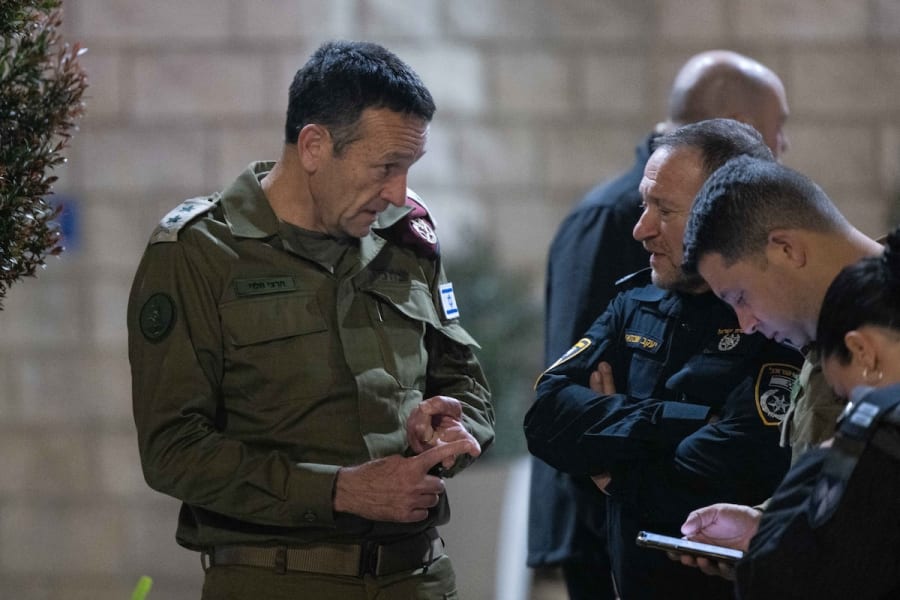Israeli security chiefs discuss Temple Mount security plan ahead of Ramadan

The heads of Israel's security establishment finalized a security plan on Sunday for the Temple Mount ahead of the Muslim month of Ramadan, which begins on March 10.
The month-long observance of Ramadan is often characterized by political and religious tensions, with a heightened risk for terrorist attacks against Israeli and Western targets. The threat level this year is particularly high amid the ongoing war between Israel and the terrorist organizations Hamas and Palestinian Islamic Jihad (PIJ) in the Gaza Strip.
Senior PIJ official Abu Hamza recently called Muslims across the Middle East to turn the upcoming Ramadan holiday into a “month of terror” against the Jewish state.
“There is no excuse for anyone to refrain from the battle. We are able to continue the battle, no matter how long it lasts. Our message to the enemy and the leader of the herd, Netanyahu, is that the issue of the next day in Gaza is determined only by the Palestinian resistance,” Hamza threatened.
Hamas has made similar threats, with its top leader Ismail Haniyeh, who is based in Qatar, recently urging Muslims to attack Israel and march toward the Temple Mount in Jerusalem.
Some Israeli officials, including National Security Minister Itamar Ben Gvir, have been calling for tough Temple Mount entry restrictions due to the high level of threat and recent incitement against Israel among Palestinians in the Gaza Strip and Judea and Samaria, internationally known as the West Bank.
"I recommend that those security officials take a look at the polls conducted in the Palestinian Authority, where they will discover the tremendous support for the massacre committed by Hamas on October 7," Ben-Gvir argued.
"I will strongly oppose the entry of West Bank Arab residents into Israel and I hope that the rest of my colleagues will behave the same way," he added.
Ben Gvir also suggested limiting access to the Temple Mount to male Arab-Israeli Muslims aged 45 or above. However, the Israeli internal security agency Shin Bet warned that such restrictions would raise anger levels and result in even higher security threats.
Shin Bet Director Ronen Bar, IDF chief Herzi Halevi and Israel Police Chief Kobi Shabtai agreed that Israel needs to strike a balance between security and ensuring freedom of worship for Muslim Israeli citizens and Muslims from the West Bank.
While Ben Gvir is formally in charge of high-level security issues as Israel's national security minister, he is a controversial figure as the leader of Israel's far-right Otzma Yehudit party, which strongly advocates for the expulsion of Palestinians from Israel, Gaza and Judea and Samaria.
In addition, Ben Gvir has a controversial history of visiting the Temple Mount and causing an escalation of violence in the region since taking office.
As a result, Israel's War Cabinet recently revoked Ben Gvir’s authority over the Temple Mount during the Ramadan period in order to prevent further escalation.
Ben Gvir blasted the decision and accused Prime Minister Benjamin Netanyahu of siding with former IDF chief and War Cabinet Minister Benny Gantz, who Ben Gvir claims believes that "peace is bought by folding and surrendering to terrorism.”
Israeli Defense Minister Yoav Gallant blasted Ben Gvir with a barely-veiled reference, saying: “In wartime, everyone says what they want - including people who are supposed to be responsible but aren’t.”
The Temple Mount is the site of the former two ancient Jewish Temples. Today the Muslim Al-Aqsa Mosque and the Dome of the Rock stand on top of the Temple Mount in the Old City of Jerusalem.
While the site is sacred to Jews, Muslims and Christians, only Muslims are permitted to pray at the Temple Mount, according to the Islamic Waqf, a religious trust responsible for managing the Islamic holy sites in Jerusalem.

The All Israel News Staff is a team of journalists in Israel.













